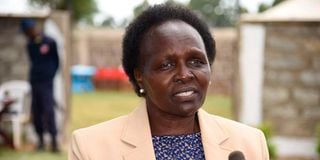Push to criminalise election offences against women gains momentum

Prof Margaret Kamar, the Deputy Speaker of the Senate. She says violence against female candidates in elections should be criminalised to deter perpetrators who have gotten away with it in the past.
What you need to know:
- Women in the country are pushing for a law that will protect them against violence meted out at them during the election period.
- Violence and other election offences have, over the years, scared women from contesting elective positions in what works against the enhanced democratic space created by the Constitution 2010.
Women in the country are pushing for a law that will protect them against violence meted out at them during the election period. They are seeking protection from law enforcers and government institutions.
Violence and other election offences have, over the years, scared women from contesting elective positions in what works against the enhanced democratic space created by the Constitution 2010.
Prof Margaret Kamar, the Deputy Speaker of the Senate, says violence against female candidates in elections should be criminalised to deter perpetrators who have gotten away with it in the past.
“That women candidates for the various elective positions in the country have been threatened, beaten and injured should be made not only an election offence, but a criminal one,” says Prof Kamar.
Though most women have contested for MCAs, MPs, the Senate and Women Representative positions, a few have offered their candidature for gubernatorial positions.
In the last General Election, however, three female governors – the late Dr Joyce Laboso (Bomet), Ms Anne Waiguru (Kirinyaga) and Ms Charity Ngilu (Kitui) were elected as governors.
Next year’s election may see more women run for various elective positions compared to past years.
Elective positions
Prof Kamar holds the view that the law as it stands, does not protect female candidates who apart from the prejudice they face while seeking elective positions, have had to bear with violence meted out at them by their male opponents.
In a recent conference held in Kericho town for nominated female MCAs from the 47 counties in recognition of the United Nation’s 65th session on Commission on the Status of Women in leadership, women leaders said their pleas for a level playground in campaigns had gone unheeded.
Prof Kamar said political parties had not supported women in gender mainstreaming in regards to the one-third gender rule in appointive and elective positions.
“It is unfortunate that parties have side-lined women in nomination to contest elective positions and only relegated them to nomination slots even when it is clear they have high chances of beating their male counterparts in a free and fair poll,” said Prof Kamar.
The MCAs regretted that Parliament had not embraced the rule on gender parity despite the existing legislations.
President Uhuru Kenyatta declined to dissolve Parliament despite an advisory by former Chief Justice David Maraga that the legislature had not adhered to constitutional provisions on gender parity.
Prof Kamar said women should elbow their way into leadership using not only their numerical strengths, but also demonstrate their ability to solve problems bedevilling the society.
Priscilla Nyokabi, Commissioner National Gender and Equality Commission, said women should run for elective positions in an environment that assures them of a level play ground in seeking for votes from the electorate.
Political parties
“We should ensure, as a country, that the two-thirds gender rule in appointive and elective positions is attained so the Constitution and the law do not become mere academic papers,” said Ms Nyokabi.
She asked the MCAs to put checks and balances on the Executive and ensure governors adhere to the gender rule when appointing County Executive Committee (CECs) members and Chief Officers.
“We cannot continue whining when we have the powers to influence the decision making at various levels of government,” said Ms Nyokabi. Anne Nderitu, the Registrar of Political Parties said women should fight to get their rightful space in elective positions and running of political parties.
“The only way women can ensure their issues are addressed is not to play second fiddle to their male counterparts in management of political parties, but ensure they get their share of positions in management of the parties,” said Ms Nderitu.\
Space in leadership
She reminded the women leaders that out of the 1,000 applications for registration of political parties, only three are led by women while only six of the registered ones led by women.
Kericho Deputy Governor Lily Ngok said women had surmounted so many challenges since independence to gain their space in leadership.
“Where women have been put in position of leadership, majority have turned socio-economic development for the better. We should use that strength as a springboard to ascend to elective positions in the next General Election,” Ms Ngok said.
She pointed out that professional women had contested for positions with men and won, a demonstration of the trust society has on women.
“We are appealing to our parents, spouses, brothers and sisters to back women for influential leadership positions in the next election so that we do not have to fall back on nomination slots to bridge gender gap,” said Ms Ngok.





